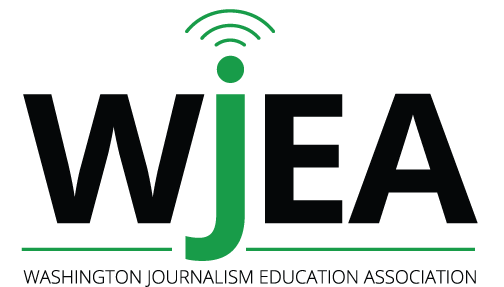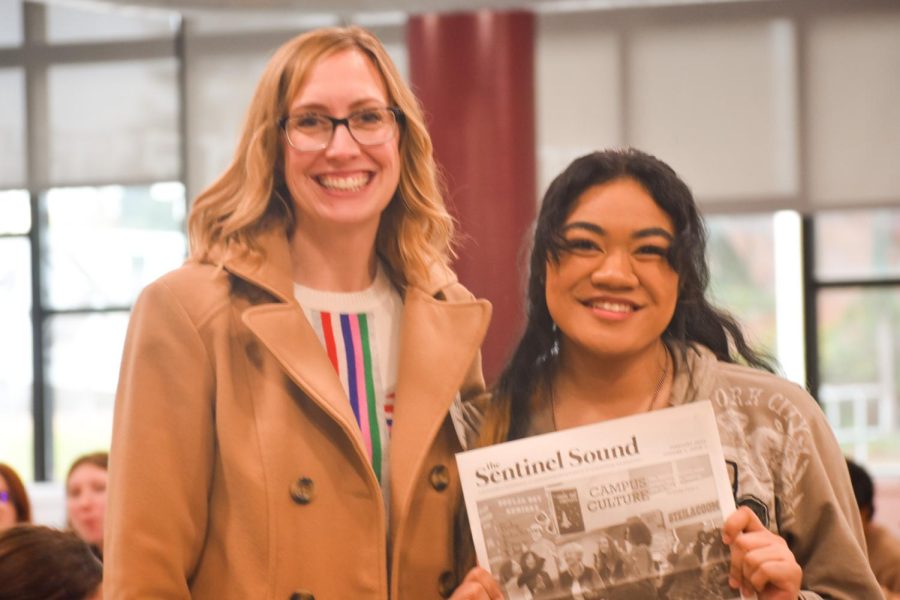Steilacoom High School journalists and Adviser put New Voices Law into Action
Adviser Lindsay Webster and Editor in Chief Kareiana Taumaletia hold the newly revived issue of the Sentinal Sound at the WJEA State Convnetion March 4 at Mountlake Terrace HIgh School.
When the student editors of the Sentinel Sound at Steilacoom High School published their inaugural reboot of the newspaper after a five-year hiatus, it was already a hard year. Three students had died, one of them, a close friend of the editor in chief.
“It got to a point where I couldn’t do it,” said Kareiana Taumaletia, the editor in chief of the paper. “I didn’t want to write about my friend in the past tense. So that was probably the toughest part for me.”
Three deaths in one year were difficult. One student died of an overdose, another, a suicide, and the third was shot in drive-by shooting while he was driving in Tacoma.
But Taumaletia also wanted to tell the story about a teacher on campus who had been accused of alleged sexual harassment. After years of persistent rumors about the teacher, a former student filed a lawsuit, accusing the teacher of allegedly groping her in class during the 2018-19 school year.
“Originally, I wanted to go towards an opinion route,” said Taumaletia, a junior, who was new to journalism writing. “Instead, I focused on what had happened, because we were never directly informed of what happened to this teacher. It was always swept under the rug.”
Students combed through the existing stories to recap the timeline. The former student filed the lawsuit in July 2021, according to various news reports, but the story did not become public until November of that same year.
The journalist spoke with former students and current students who had joined a school walkout to protest the lack of communication from the district. Students who spoke were angry that the teacher named in the lawsuit had remained on staff despite the complaints, and the district had not communicated what they believed was key information.
He didn’t retire until November 2022, according to Lindsay Webster, the adviser to the Sentinel Sound, who had returned to teaching after a 10-year hiatus while raising her kids.
“Even in the fall, students weren’t sure if he was going to be on campus,” said Webster in an interview at the WJEA state-wide journalism convention this past March. “When he finally retired, they started talking about the article. I said you have every right to write about this.”
Taumaletia had taken on some heavy material for her first ever issue, but felt the story was important to help rebuild trust in the school.
“After everything being swept under the rug, a lot of the students, including myself, didn’t have trust in the school anymore, so letting them know what was happening was a first step to rebuilding that trust with the administration,” said Taumaletia.
Talking to the administration felt hard at first, said the student editor, but ultimately helped her understand their perspective when she reached out for the article.
“I knew they were trying to be careful with what was said, but afterwards it opened my eyes to what they do know and what they don’t know,” said Taumaletia. “As you have more of a conversation, it made me feel like they were willing to be on my level and actually explain things instead of brushing it off.”
The paper was operating under an expectation of prior review, set up when Webster started the year as a teacher new to the district. Before leaving education, she had been voted a Rising Star in the Journalism Education Association (JEA) a national organization for scholastic journalists and educators, but had left teaching before laws regarding student press rights in Washington State had changed.
In the week before printing, Webster says she was contacted by a district representative, claiming that the story would violate the Tinker standard, which provides students with their First Amendment rights, unless it invades the rights of others, is libelous, obscene or causes a substantial disruption to the school day.
“‘It’s all news, there is no editorializing,’ I said. ‘I don’t think it violates the Tinker standard at all,’” said Webster, describing conversations the day before the article was set to go to the printer. “The district representative says, ‘I think it does.’ Basically, it was inferred that if we did go to print it, they might respond.”
The tension was high and the editors and adviser needed to decide on how to handle the situation.
“I was like, this is our first issue, she is brand new, we are all brand new, I am just getting back into it, and it is so big already,” Webster said. “My principal wanted to know if I was going to print or not. I was like, ‘I can’t tell you that, I need to talk to my students and make some phone calls.’”
Wagner emailed Kathy Schrier, the executive director of the Washington Journalism Education Association who is practiced in helping student journalists and advisers in Washington state navigate thorny legal issues that crop up.
Schrier was one the advocates responsible for pushing the New Voices law through the state legislature in 2018, which strengthened First Amendment rights of student journalists. Washington is one of 16 of states in the country who have passed the law. Washington was 14th to pass the law. Hawaii and New Jersey were 15 and 16.
The New Voices Act protects the press freedom of student journalists and their advisers from being penalized for student content, except in narrow circumstances.
“It seemed clear that the story, from the perspective of the law, had nothing illegal in it,” said Schrier. “My immediate concern was that Lindsay had just returned to teaching after more than 10 years away, so she wasn’t aware of our New Voices law. It appeared that her administrators were unaware of the law, as well.”
Schrier suggested that the editor contact the SPLC, which provides a panic button for students in need of legal help.
“I felt that if Lindsay’s editors could quickly become familiar with the law and set up a meeting with administrators to explain why hushing the story would be out of compliance with state law, that they would back down. This, in fact, is what happened,” said Schrier.
The new law also requires that districts change the language in outdated policies that aren’t compliant with the new law.
There is no deadline for districts to do this, says Schrier, which means that many district policies still contain out of date language.
“The law is the law… whether their district policies are up-to-date or not,” said Schrier. “This means that if school officials impose unjustified censorship on student media content, they will be breaking the law, regardless of what their district policy says.”
After discussions with her editor in chief, Schrier and the SPLC, Webster crafted a letter to the superintendent, asking for her to get behind the article.
‘“I said the student voices are super important, they already don’t feel heard, especially with this issue and I think any change, to pull, or alter is going to further that belief that students have that you don’t care about what they feel or think. I hope that the Sentinel Sound can be a source of pride for the district,’” said Webster.
According to Webster, the next day the district superintendent contacted her to clear up any miscommunication and to say they supported the work of the student journalists. “I said, ‘great, I will bring some copies to the district office, and that was it.’”
The issue printed was a heavy one that encapsulated the painful year. Three stories about the student deaths, a story about the dangers of fentanyl and the story about the former teacher with a photo of the student walkout.
The students also covered a local pop-punk band, a Peruvian student who fled the recent unrest in his country, and the theft of student assignments when a teacher was robbed at a gas station. There were other features and news briefs of happenings around the school.
“My students were incredibly excited to distribute the paper,” said Webster, which she said caused a “hubbub” on campus. “Every single student group, their phones were down, the newspapers were in their faces, everyone was reading it at lunch and my staff was just blown away. They were beaming. Campus was lit up. You had one kid reading the paper and others hovering over it.”
Taumaletia describes the feeling of distribution as exhilarating.
“To be honest it was euphoric,” said Taumaletia. “I felt so good after we were able to, because even though they were hard topics, there were something that needed to be talked about, and I didn’t want to drop it, because this is for the better for our students in the school, and my first concern is that they know what is going on.”
The editor in chief says the experience helped lift her from the grief she had experienced from the very difficult year.
“It kind of just showed me that I do have a purpose,” said Taumaletia, “and like, with the grieving process, I noticed that I lost my passion in everything else. So going through this, being able to honor my friend, and also be able to fight for what I think is right, and ultimately winning that, it was like, I can do things, it brought life to me.”

Vice President Anna Ferdinand has taught English and journalism at Sedro-Woolley High School in Northwest Washington for nine years. Anna studied at New...



